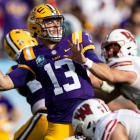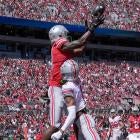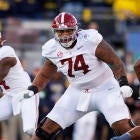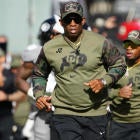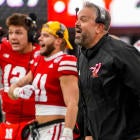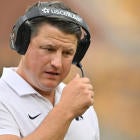U.S. District Judge Claudia Wilken's importance to the future of college sports will be on full display Wednesday in Oakland.
As Wilken presides over the Ed O’Bannon vs. NCAA trial over whether athletes should be allowed to get paid for their names, images and likenesses, she is also starting to focus on athletic scholarships cases. Wilken is scheduled to pull double duty Wednesday by presiding over the O’Bannon trial and then a case management conference for lawsuits alleging the NCAA and its most prominent conferences illegally capped the value of scholarships.
What college sports looks like in the future will be determined in large part by Wilken, chief judge of the Northern District of California since 2012. She will step down as chief judge in December and take senior status.
Wednesday's conference in the scholarship cases is intended to help establish a procedure for selecting the lead counsel for plaintiffs, set a deadline to file a consolidated amended complaint, and set a schedule for the defendants to respond.
Earlier this month, the U.S. Judicial Panel on Multidistrict Litigation ruled that the Shawne Alston and Martin Jenkins scholarships lawsuits against the NCAA and its conferences will be centralized before Wilken. There is disagreement over whether to consolidate all of the cost-of-attendance cases with prominent sports attorney Jeffrey Kessler’s Jenkins suit, which seeks a free market for recruits.
There are six overlapping class-action lawsuits over scholarships that have been identified:
* The lawsuits started in March when Alston, a former West Virginia football player, sued the NCAA, SEC, ACC, Big 12, Pac-12 and Big Ten in the Northern District of California. Alston alleges the Power Five conferences are colluding because they said they would implement the cost of attendance stipend if they weren’t bound by “collusive agreements” with smaller Division I schools. Alston seeks an injunction and damages that, under antitrust law, could be worth more than $200 million.
* Less than two weeks later, Kessler filed the Jenkins lawsuit, named after the current Clemson football player. Jenkins is also suing the NCAA and the Power Five conferences, but this case only seeks an injunction, not class-action damages. The Jenkins case, filed in New Jersey, argues that no NCAA payment cap is legal in a free market.
* In mid-April, former Minnesota and Northern Colorado football player Kendall Gregory-McGhee sued the NCAA and the Power Five conferences in Minnesota with very similar complaints as Alston. McGhee seeks damages, an injunction related to NCAA rules, and the appointment of an antitrust compliance monitor.
* Less than two weeks later, former Florida football player Sharrif Floyd and other ex-players sued in Minnesota, accusing the NCAA, the 10 Football Bowl Subdivision conferences and the Atlantic Sun of forming an “illegal cartel” capping the value of athletic scholarships. The suit seeks unspecified damages and an injunction related to NCAA rules. Most importantly, the case is believed to be the first antitrust suit against the NCAA involving women’s sports. Former Kennesaw State women’s basketball player Ashley Holliday is a named plaintiff.
* In late May, former West Virginia football player Nick Kindler sued the NCAA and the Power Five conferences over cost of attendance. Kindler’s suit, filed by the same lawyers as Alston’s, was created largely to centralize the case in the Northern District of California. Also, the Kindler suit alleged the Power Five are still acting as a cartel in ongoing cost-of-attendance talks, citing a letter in May by Pac-12 presidents to the other major conferences. Kindler wants an antitrust compliance monitor appointed.
* Finally, one day before the judicial panel heard arguments on where to locate the cases, former Tulane football player Alex Lauricella sued the NCAA, every FBS conference and the Atlantic Sun over cost of attendance. The suit, filed in Louisiana, seeks damages and an injunction to change NCAA rules.
The NCAA and the Power Five conferences denied engaging in unlawful conduct, “and it is expected that the other six defendants will take the same position should they remain as parties in the ultimately coordinated or consolidated proceedings before this Court,” according to a joint case management statement filed last week by attorneys for the NCAA, the five major conferences and most of the plaintiffs.
The Alston lawyers held a teleconference with plaintiffs’ counsel for all six cases on June 9 to discuss a potential structure. Jenkins’ attorneys do not agree with administering the case on the same schedule as the other plaintiffs’ damages claims.
The joint statement said Jenkins’ lawyers want their injunctive relief claims expedited in a separate bench trial not tied to the various damages claims, and that they need lead counsel that’s different from the other cases. Jenkins’ lawyers proposed a conference to address the issues once all of the cases have been transferred to Wilken.
According to the joint statement, “Counsel for all plaintiffs other than the Jenkins plaintiffs disagree with this approach and point out that the Alston case was the first filed challenging the conduct at issue, and that it also seeks injunctive relief as do all other cases. None of the law firms representing plaintiffs in any of the other cases agree with the Jenkins comments above regarding lead counsel.”
During the opening week of the O'Bannon trial, Wilken asked some questions to witnesses about athletic scholarships, such as how federal Pell Grant aid impacts what players receive. In the coming days, months and (possibly) years, Wilken will be asking those questions as part of the next wave of NCAA litigation.












